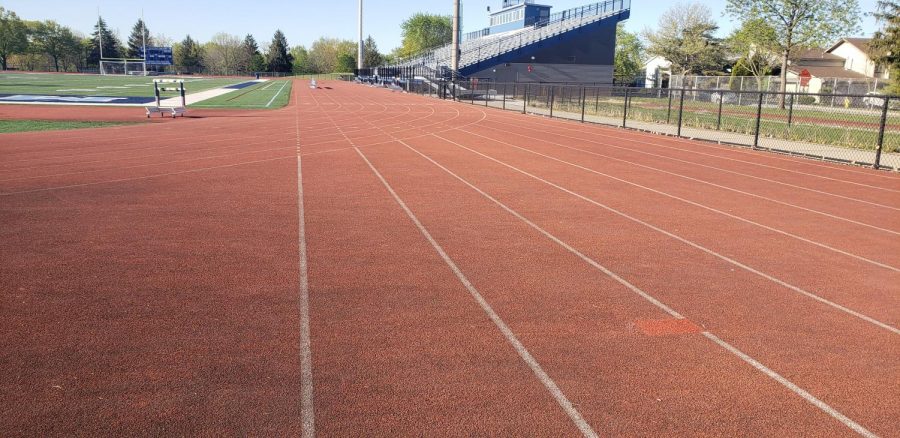Track team looks to capitalize off shortened season
With no indoor season, the boys’ track team looks to take full advantage of the outdoor season
May 12, 2021
While the track season typically begins in January for its indoor season, it instead began right after spring break with its outdoor season due to COVID-19 restrictions with indoor sporting events.
Despite the season being cut nearly in half, it hasn’t deterred any runners, especially fourth-year sprinter senior Chris Pogorelec who describes the obstacles of this season.
“The running environment has changed because now after COVID-19 everyone is cautious about coming into contact with people. This season this year was shorter than it normally is, so we had a lot less time to get into shape than usual, so the times were slower,” Pogorelec said.
Despite these drastic changes, some adapted well for this season after running cross country in previous years, especially for senior distance runner Caleb DeBoer who is in his fourth year as well.
“The environment is about the same, but around 40 people had to quarantine because someone got Covid-19; a goal we have is to not have any more Covid-19 cases among the school,” DeBoer said.
With being well-adapted with the shortened season, DeBoer plans to continue his track career post-high school and reflected back on how he has improved throughout his four years on being on the team.
“I want to run at College of Dupage; my 3-mile time improved by 8 minutes [and my] mile by 2 minutes.”
Head Track Coach Sean Senf describes some of the challenges that came with this season.
“It’s actually been pretty hard. For sprints and jumps, we had to be very careful about not overloading the athletes too quickly. Usually, we have the indoor season to help athletes go from zero track and having not done it since a year ago. With no indoor season, we had to be more methodical in our planning, so we get enough intense workouts,” Senf said.
Senf also emphasized how the distance team had been well-oiled before and during the canceled indoor season.
“The distance guys have been doing a lot of work on their own and finally being able to come in and start working with each other and running workouts has made their progression jump. They have already done their homework in the winter — they run by themselves a lot — and they have benefited a lot from jumping back in,” Senf said.
With the shorter season presenting a challenge, Porgorelec further detailed how motivation and fewer meets play a key role as well.
“There is also fewer meets, so you don’t get as many opportunities to run good, so you need to make the best of your opportunities. Also, the distance team had to quarantine, so even though this didn’t affect me, all the distance guys had to practice on their own instead of as a team, which makes you less motivated,” Pogorelec said.
As said earlier, the distance having the quarantine presented yet another challenge for the team as Senf described how everyone navigated through it.
“Track is kind of individual, but at the same time, we come together every week to talk about our goals as a team, and this year we haven’t been able to do much of that because we don’t want to cross-contaminate groups. The sprinters and jumpers work together, the distance guys are with themselves as well as the throwers, so the whole team won’t be affected,” Senf said.
Despite the team’s overall confidence not being as strong as in a typical season in past years, the team coming together as one at a meet is more important than ever.
“It [confidence] goes up at meets because it feels real again because we are all fighting for points and doing the best we can,” Senf said.




